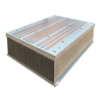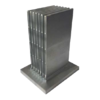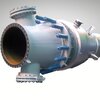
Enhance your designs with Mersen simulation tools
Our simulation tools help you optimize designs, reduce risks, and streamline workflows, ensuring efficient and reliable results. A powerful tool to predict, understand, optimize and innovate faster!
-
Empower your innovations
Simulations tools for specific markets, even in extreme conditions
Extreme applications demand precision, reliability, and performance. Mersen's simulation tools are engineered to meet these challenges across various industries.
In the chemical industry, our heat exchanger configurator for chemicals designs equipment perfectly suited to corrosive processes.
Simulation tools for railways contribute to enhancing the durability and efficiency of electrical systems under high-speed travel conditions.
For wind energy, simulation tools for wind energy help optimize turbine performance and extend component lifespan.
Our promise: to empower your innovations with cutting-edge simulation technology, providing a virtual testing ground to perfect designs, minimize risks, and achieve excellence.
-
Development time reduced significantly
Thanks to Mersen's simulation tools, we reduced our development time significantly. By virtually testing and optimizing designs before physical prototypes, we identified and resolved issues early, streamlining our entire process.
Ema Kraken
Lead Mechanical Engineer
-
Definition
What are simulation tools?
Simulation tools are advanced software applications that allow engineers and designers to create virtual models of systems, components, or processes. These tools enable the simulation of real-world conditions, helping to predict the performance, identify potential issues, and optimize designs before physical prototypes are built. By using simulation tools, companies can save time and resources, improve product quality, and reduce the risks associated with new developments.
-
Benefits
Why use simulation tools?
Simulation tools offer a multitude of benefits that streamline the design process, enhance performance, and reduce costs.
Here are the key reasons to use simulation tools:
Simulation tools for bettering plan the integration of parts into existing systems
Simulation tools allow engineers to virtually visualize the interaction between new elements and existing systems. This helps identify potential fit problems before physical manufacturing or installation, optimizing the location and layout of new elements. By doing so, it reduces the risks of errors and costly modifications during actual integration.
Simulation tools for reducing development time and costs
Using simulation tools, engineers can test and validate concepts virtually, avoiding the need for long and expensive physical prototypes. These tools enable the exploration of different design options quickly and easily, identifying and solving design problems earlier in the development process. This improves overall development efficiency by reducing test-fix cycles.
Simulation tools for optimizing systems performance
Simulation tools are essential for analyzing the flow of energy, heat, fluids, and other elements within a system. They help in identifying bottlenecks and areas of inefficiency, testing different configurations and parameters to improve performance. This optimization leads to better efficiency, reliability, and extended lifetime of the system.
Simulation tools for identifying and resolving issues more quickly and easily
By simulating failure scenarios, simulation tools help identify weak points in the system. They analyze mechanical, thermal, and electrical stresses to prevent damage, visualizing problems in a clear and understandable way for faster resolution. This reduces downtime and maintenance costs through better problem prevention.
Simulation tools for accelerating the prototyping and design phase
Simulation tools enable engineers to quickly test many design iterations virtually, obtaining feedback and analysis on design performance before physical manufacturing. This reduces the need for expensive and time-consuming physical prototypes, allowing for more precise refinement of the design before moving to the final production phase.
-
Focus on
Simulation tools for railways
One of the significant challenges in railways is the optimization of electrical systems to ensure consistent and efficient power transfer.
Simulation tools for railways allow engineers to model the behavior of current collector devices under different operating scenarios. This helps in designing components that provide optimal performance.
A specific application of simulation tools for railways is in the development and testing of rail current collector shoes (CCD Shoes). These devices are crucial for transferring electrical power from the track to the train. By simulating the interaction between the CCD Shoes and the rail track, engineers can enhance their design for better durability and power transfer efficiency, ensuring reliable operation in modern railway systems.
Additionally, the integration of new technologies and the need to improve sustainability require thorough testing and validation. Simulation tools for railways enable the virtual testing of new materials and designs, such as advanced bus bars and railway fuses. These tools ensure that new components meet the stringent demands of the railway environment, including resistance to vibration and thermal expansion, high conductivity, and safety against overcurrents and short circuits.
-

-
Find out more about Mersen simulation tools below!
Mersen offers a series of simulation tools designed to enhance the performance and reliability of your projects across various industries.
-
Heat exchanger for Chemicals
Mersen's heat exchanger configurator is tailored for the chemical industry, focusing on the design of graphite block heat exchangers. Utilizing an online configurator, you can build your ideal heat exchanger by answering a series of questions about your requirements. This includes specifying the country, whether the unit is existing or new, the nature of the corrosive process, the duty or heat transfer area, and the type of cooler (liquid or gas) and heater. Once the details are provided, the configurator generates a customized solution, complete with a 3D view of the heat exchanger, ensuring optimal performance for your specific application.
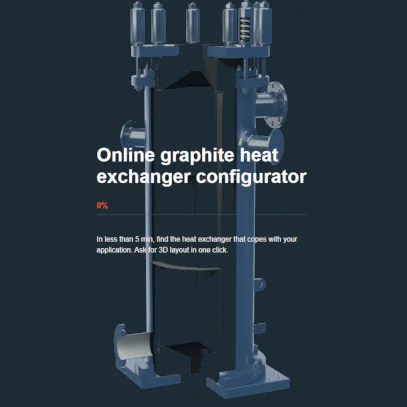
-
FUSE-ion Configurator and Selector Tool
The Mersen FUSE-ion Configurator and Selector Tool lets Mersen partners design your own custom-configured Fused Coordination Panelboard by selecting the ratings, features, and options you want via a graphical interface. The Mersen FUSE-ION Configurator and Selector Tool will also provide a quote and download a PDF of the configured job. Mersen engineers will also work with you to design a solution that fits your requirements.
Access to the Mersen FUSE-ion Configurator and Selector Tool is by a separate user name and login from the login used to access ep.mersen.com. For access to the Mersen Fusion Configurator and Selector Tool, please contact your Mersen Regional Manager.

-
Heat Sink
The R-TOOLS MAXX is a state-of-the-art, no-charge online simulation software designed to model the most efficient air or liquid-cooled heat sink solutions. This simulation tool allows users to quickly generate simulations that aid in reducing design time and increasing the reliability of the finished product, even before the first prototype is built. R-TOOLS MAXX offers a modern, user-friendly interface with enhanced graphical simulation visuals. Users can enter boundary conditions, heat source details, and flow boundaries to find the best-fitting heat sink. The tool is available online 24/7 and incorporates the latest simulation modeling software, providing detailed solutions with minimal time investment. This robust tool helps create optimal thermal designs while considering electrical and manufacturing elements.
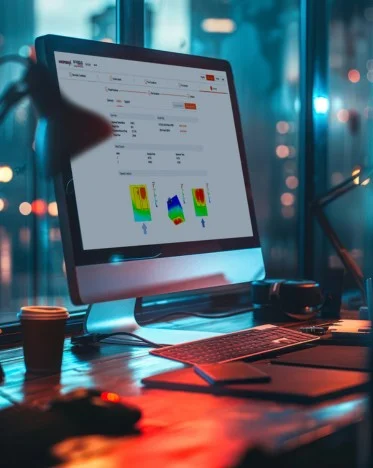
-
Material property
Mersen's material property simulation tools allow for the modeling of advanced materials such as graphite and composites under various conditions, including temperature, pressure, and stress. These simulations help in optimizing the material properties for specific applications, ensuring that the materials perform reliably and efficiently in real-world conditions.
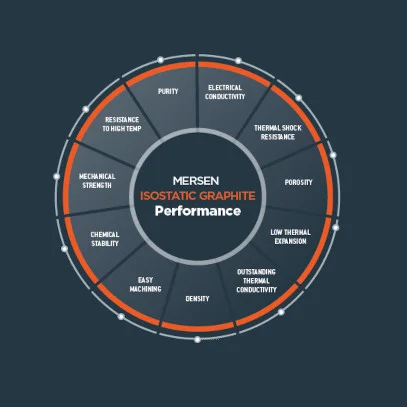
-
Why choose Mersen for your simulation tools?
At Mersen, we are committed to providing state-of-the-art simulation tools that cater to the unique needs of various industries. Our expertise and dedication to innovation make us the ideal partner for your simulation requirements.
Simulation tools are tailored towards specific industries
We understand that each industry has its own set of challenges and requirements. That's why our simulation tools are specifically designed to meet the demands of sectors such as chemicals, railways, wind energy, and more. By tailoring our tools to address the unique needs of these industries, we ensure that you get the most accurate and relevant results for your applications.
Mersen is an expert in simulation tools and an innovator
With decades of experience in simulation technologies, Mersen stands at the forefront of innovation everywhere on the planet. Our team of experts continuously works to refine and improve our simulation tools, ensuring you benefit from the latest advancements in simulation technology.
An advanced customization of simulation tools and tests
Our simulation tools offer advanced customization options, allowing you to tailor the simulations to your exact specifications. Whether you need to model complex thermal dynamics, electrical behaviors, or material properties, our simulation tools provide the flexibility and precision required to achieve optimal results. This customization capability ensures that your simulations are accurate and highly relevant to your unique application.
An easy integration with simulation tools, such as 3D images
We strive to make our simulation tools as user-friendly and integrative as possible. Our tools are designed to provide 3D images through our heat exchanger configurator. This capability allows you to visualize your designs more effectively, enhancing your ability to optimize and refine your projects. By providing detailed 3D images, Mersen helps you streamline your design process and achieve better outcomes.
-
Frequently asked questions about simulation tools
We've got the answers!
-
What information should I provide to Mersen teams to use the heat exchanger configurator?
To benefit from Mersen's simulation tools, provide detailed information such as duty (KWh), heat transfer area, type of cooling (liquid or gas), type of heater, corrosive process details, and whether the unit is existing or new. This helps in tailoring the simulation to your specific needs.
-
How does simulation for bus bar and heat sink allow to optimize current carrying capacity and heat dissipation?
Simulation tools for bus bars and heat sinks optimize current carrying capacity and heat dissipation by accurately modeling electrical and thermal behaviors. This helps in designing components that maximize efficiency, reduce thermal hotspots, and ensure reliable performance under various operating conditions.
-
Do you offer training on the use of simulation tools?
Yes, we offer comprehensive training on the use of our simulation tools. Our training programs are designed to help you understand the capabilities of the tools and how to effectively integrate them into your design processes.
-
What are simulation tools used by Mersen?
Mersen uses simulation tools for a variety of applications, including optimizing heat exchangers for chemicals, modeling bus bars and heat sinks, simulating the properties of advanced materials, and ensuring the optimal performance of electrical components like fuses and surge protectors. These tools enhance the design, efficiency, and reliability of products across multiple industries.
-
-
Contact
Need to get information on our simulation tools services?

